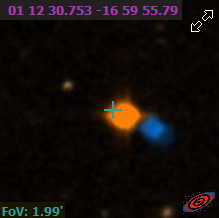

Lily's planet is fictitious, but her star isn't. Her world circles YZ Ceti (also called HIP 5643) about 15.5 light years from here. Note in the photo below, the blue patch is likely an internal reflection in the telescope.
It is a red dwarf star similar to the fascinating Trappist system.
YZ Ceti
| Mass | 2.585×1029 kg (0.13 Sol) |
|---|---|
| Mean radius | 116994 km (0.168 Sol) |
| Temperature | 3,056K |
| Life span | 6.476x1011 years |
| Age | 5x109 years |
| Spectral type | M4.0Ve |
| Apparent mag | 12.03-12.18 |
| Metallicity [Fe/H] | -0.26 dex |
| Constellation | Cetus |
| Right ascension | 1h 12m 30.64s |
| Declination | -16o 59' 56.3" |
| Local Brightness | 116662 lux (0.91 Sol) |
Like the worlds of Trappist 1 (some of which might be habitable!) hers is tidally locked. Her large sun looms large and stationary in the sky. Her planet has a ring of habitability where her sun is low in the horizon. Areas closer to the sun are too hot and areas further away, in the dark side are far too cold. The imbalance between the two halves create powerful storms.
These small stars' brightness tends to be somewhat unstable so Lily's world has seasons. It's impossible to predict when the next season will arrive. Her people frequently need to relocate to more hospitable regions and never got the chance to develop agriculture. They permanently remain hunter gathers.
Her world orbits its tiny star so close (0.048AU) her sun looms large in the sky. It appears 1.86 degrees wide which is about 3.5 times the width of the our sun in our sky.
Astronomers have already detected three planets around YZ Ceti. All three are too close to be habitable. Like the planets in the Trappist system, YZ Ceti's planets appear to be in resonate orbits where planet orbital distances are based on specific ratios. I calculate a 6th planet would be in the habitable zone. With a thick atmosphere and orange / red sun, I've called it Hades. When additional data is observed for YZ Ceti, we'll see how close I came for this fantasy world.
Hades (YZ Ceti f)
| Mean radius | 5924 km (0.93 Earth) |
|---|---|
| Surface area | 4.41×108 km2 (0.86 Earth) |
| Volume | 8.71×1011 km3 (0.8 Earth) |
| Mass | 4.62×1024 kg (0.78 Earth) |
| Mean density | 5.31 g/cm3 |
| Surface gravity | 8.8 m/s2 (0.9 g) |
| Day Length | infinite (tidally locked) |
| Orbit radius | 7.194×106 km |
| Orbital period | 10.683 Earth days |
| Escape velocity | 10.21 km/s (0.91 Earth) |
| Albedo | 0.26 |
| Atmos. Density | 13.3 kg/m3 |
| Atmos. Press | 10.728 bar |
| Percent N2 | 96.1% |
| Percent O2 | 3.5% |
| Land % | 92% (including frozen half) |
| Max elevation | 6897m |
| Obliquity | 0.07 deg |
Her atmosphere is dense enough for her to fly, but the percentage of Oxygen (O2) is much lower than Earth's. It wouldn't do to make Hades highly flammable!
Here is Lily in her native environment. The red hue is due to a combination of her planet's thick atmosphere and the rather low level of shorter wavelengths emanating from small stars. Seeing her here, one could believe she's a real succubus in Hell!
Copyright © 2017-2018 by David White
This page last updated 7-Feb-2018